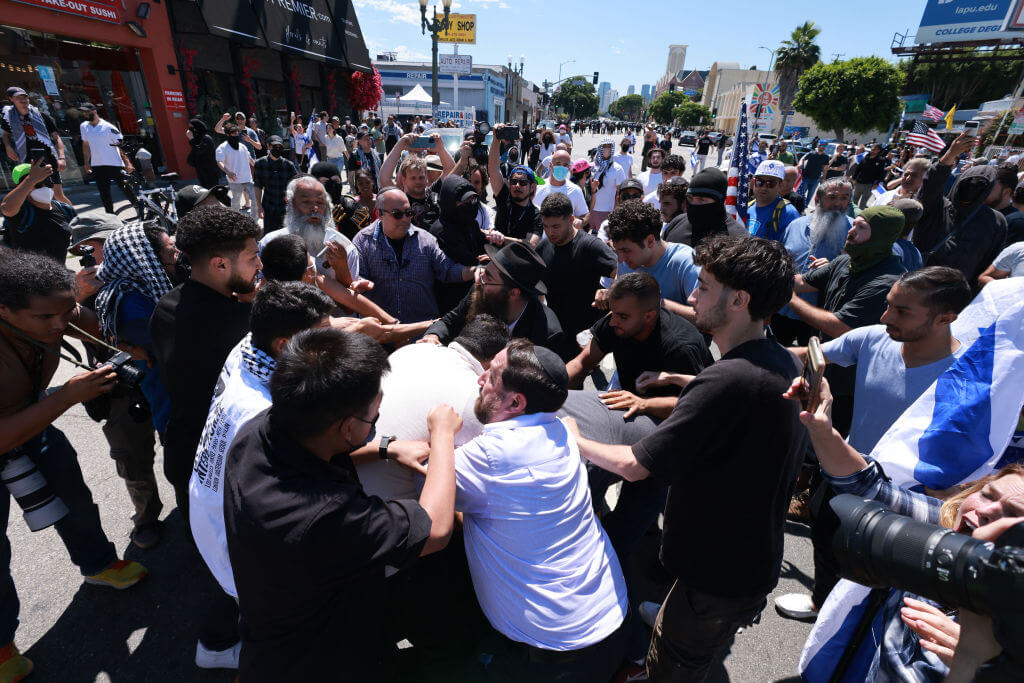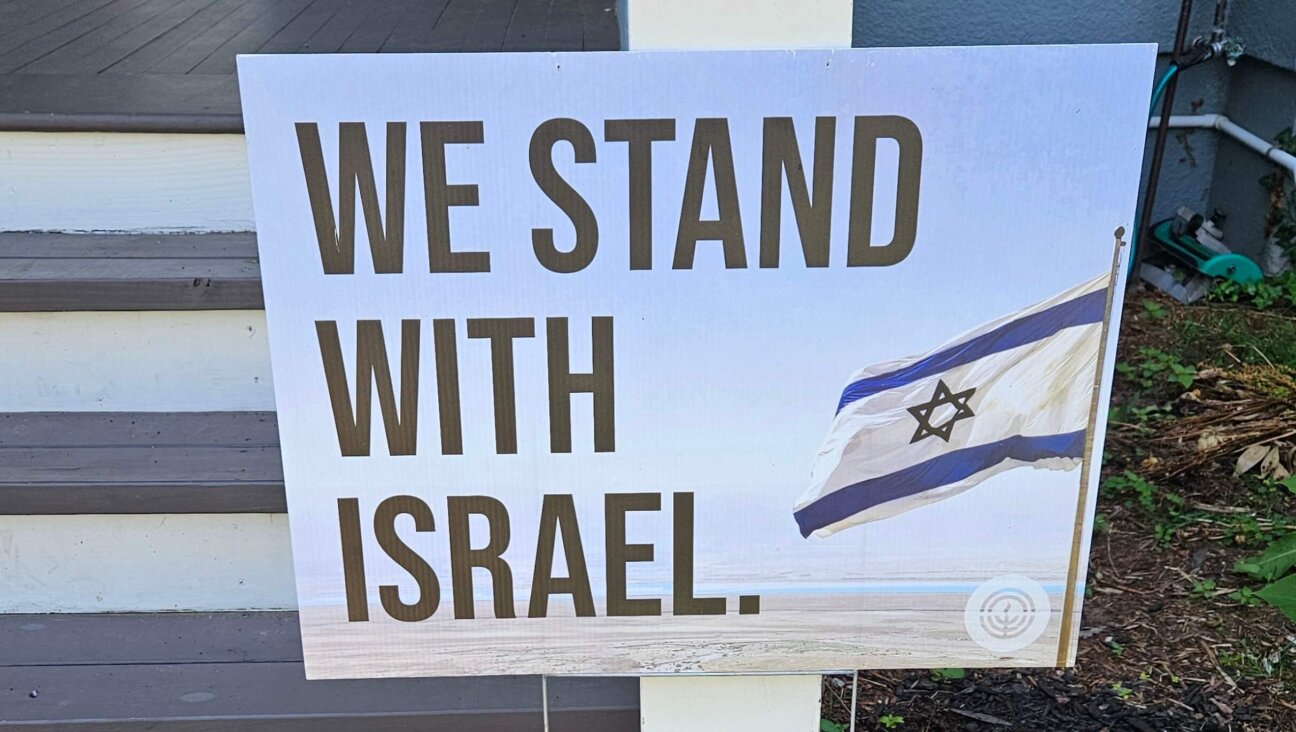As ceasefire talks continue and protests rage, here are the 5 biggest questions facing Israel
Israelis wave their national flag during an anti-government rally calling for early elections outside the Knesset June 18. Photo by Menahem Kahana/AFP/Getty Images
There’s never a dull moment in Israel. Straddling the faultline of humanity’s many fantasies and foibles, the country is always in some sort of agitation.
But rarely before have so many pressures converged in one moment.
Israel faces ever-increasing hostility across the globe over the immense Palestinian civilian death toll in its war with Hamas; Prime Minister Benjamin Netanyahu has dissolved the war cabinet, and is more desperate than ever to keep the loyalty of the far-right parties on which his governing coalition depends; new estimates suggest as few as 50 hostages may still be alive in Gaza; and clashes with Hezbollah are escalating to the point where full-on war is a genuine threat.
Meanwhile, this week, demonstrators insisting on a quicker agreement to release the hostages flocked to Jerusalem by the tens of thousands, and were greeted by a considerable degree of police violence. The only moment of equivalent internal strife, in my recollection, came with the wave of right-wing riots that ended in the assassination of Prime Minister Yitzhak Rabin in 1995.
No one in Israel can say where this will go. These are the five biggest questions the country must contend with as it seeks a way out of the morass.
Will Hamas agree to the US-backed ceasefire deal with Israel?
For months, Hamas has insisted that it will only release the remaining hostages — both the living, and the remains of the dead — in exchange for the end of the war and a complete Israeli withdrawal from Gaza. Israel has understandably balked at meeting this demand; one of its primary goals, understandable after Oct. 7, has been to remove Hamas from power in Gaza.
But the need to retrieve the hostages has proven a hugely complicating factor. So long as they are held as human shields, completely taking out Hamas and rescuing the hostages may be incompatible goals.
The ceasefire proposal that President Joe Biden announced in late May all but amounted to an acceptance of Hamas’ terms, calling for an Israeli pullout from Gaza and an end to the war. Netanyahu and Hamas have both suggested they are open to accepting the deal — indeed, Biden presented it as an Israeli proposal. And yet, neither side has affirmatively signed on.
This seems to be an impasse that clever mediators and even a modicum of good faith by the combatants should be able to overcome. What’s clear is that Hamas holds more power: If they accept the deal, the war will probably wind down — and with it, hopefully, hostilities with Hezbollah.
How long can Israel keep the war with Hamas going?
Even if there is no deal, at some point Israel will have to end the war. It is an open question whether Israel could, given enough time, truly eliminate Hamas as a fighting force in Gaza. Already, there are voices in Israel — and in the military — arguing that after the current Rafah operation, Israel should wind down the major military phase, pull out most troops, leave Hamas in place, and focus its attention on the north.
In part, this would be a concession to the reality that Israel is not built to fight very long wars — because its dependence on reservists creates too big a drag on its economy.
Leaving Hamas in place would enable the jihadis to promote something of a victory narrative, in what would amount to a self-created defeat by Israel, resulting in part from Netanyahu’s refusal to contemplate allowing the return of the West Bank-based Palestinian Authority to Gaza. This position largely is the result of opposition from the extreme right, which prefers the idea of an Israeli occupation of Gaza. But if Israel wants Hamas gone and a different Palestinian ruler in Gaza, it has few alternatives to some version of the PA.
Will war break out with Hezbollah in the north?
It is an outrage that Hezbollah has been shelling Israel since October, and that the group, which answers only to Iran and is completely independent of the Lebanese government, has somehow been allowed to use Lebanese territory with impunity.
Yet the group’s strategy is not without logic: By saying they will continue to attack Israel as long as the Hamas war continues, they add to Israel’s incentives to end the war. Should that happen — especially with Hamas still in place in Gaza — Hezbollah will be able to partake in the jihadi victory narrative.
The group has so far been cautious to not force Israel’s hand by inflicting mass casualties. Most of its shells end up in fields; only a handful of Israelis have been killed. But an errant projectile that lands in a kindergarten — as could well happen — could change the equation in a flash.
Israel does not want a war in the north, but must take a strong stand against Hezbollah. At the same time, Hezbollah credibly threatens to target Tel Aviv with Iranian-supplied rockets likely to penetrate air defenses, which is intolerable. Israel has threatened that, if Hezbollah were to inflict more damaging strikes, it would then give Beirut the Gaza treatment — which is unfair, because the Lebanese do not control Hezbollah.
And yet this threat, if credible, may in fact deter Hezbollah, in a way that Hamas has not been deterred by the destruction of Gaza. Hezbollah is part of the Lebanese political scene, and hesitates at times to act too drastically in opposition to Lebanese public opinion. It is, perhaps, somewhat more rational than Hamas in this way.
The degree of that rationality will ultimately determine whether we will see a major escalation. If we do, Iran seems likely to get involved, potentially sparking a broader regional conflagration, and potentially forcing American military involvement.
Will the government fall due to domestic religious schisms?
Incredibly, if the government falls it may not be because of the breakdowns of Oct. 7, or because of Israel’s failures in the war. The real agitation in Israel in recent weeks has revolved around the coalition’s efforts to satisfy the Haredi parties, which could at any moment bring down Netanyahu by depriving him of his majority.
In one case, the government is engaged in a complex legislative maneuver to extend and make formal — after decades of informality — the draft exemptions provided to any Israeli male of conscription age who is studying in a yeshiva. The majority of Israelis view these exemptions as a scam. What began as a special perk for a few hundred true scholars has come to apply to nearly a quarter of Israel’s potential draftees, a proportion that is only growing, due to the stupendous Haredi birth rate of some seven children per family.
Rebellion has long brewed in Netanyahu’s coalition about this issue, from both sides. Yoav Gallant, the defense minister, has made clear he will not support the law. Several Likud Knesset members, like Tali Gotlieb, have criticized it as well. Off the record, it is despised by the majority of them.
This week brought a second bill that would have the government spend more untold millions from its dwindling coffers to appoint scores of rabbis in neighborhoods and towns all over the country, including completely secular places who want no part of this make-work scheme for cronies of the religious parties. It is hard to describe the level of rage this is causing, with massive demonstrations at the Knesset and even members of the coalition charging that Netanyahu is going too far in what is clearly a bribe to his religious allies, and in particular the Shas party representing religious Sephardic Jews. Likud municipal leaders appeared at the Knesset’s Constitution, Law and Justice Committee this week and threatened their own party’s lawmakers that they would be punished by voters if they supported it.
Netanyahu on Wednesday called on his coalition members to “get a grip” and stop leaking speculation about a coalition collapse to the press.
There is a point at which there are too many balls in the air. Increasingly there is a sense that the coalition might actually collapse, because public rage is growing so great that even members of Netanyahu’s Likud Party might conclude it will make them unelectable for years.
Will Biden snub Netanyahu?
Netanyahu is meant to address a joint session of Congress in late July. The Republicans are the driving force behind his invitation, with some Democrats threatening to stay away. The entire circus will be seen as another instance of Netanyahu attempting to influence U.S. elections — as he did in 2020, when he transparently supported Trump, and as he has done for years in coddling primarily the Republican Party. Indeed, it is understood by most observers that even as Biden is paying a political price for supporting Israel in the war, Netanyahu is trying to undermine his reelection.
Under these circumstances, will Biden deny Netanyahu an invitation to the White House? You can bet your bottom shekel he’d like to, and it’s fair to say Netanyahu would deserve it — but it would be an extremely loud telegraphing of the schism between the two. That could be dangerous and might undermine diplomatic efforts by making Israel look estranged from the U.S. That’s because Israel’s close alliance with the United States has been a key part of the decadeslong process of Arab countries’ coming to terms with the existence of Israel.
I hope you appreciated this article. Before you go, I’d like to ask you to please support the Forward’s award-winning, nonprofit journalism during this critical time.
Now more than ever, American Jews need independent news they can trust, with reporting driven by truth, not ideology. We serve you, not any ideological agenda.
At a time when other newsrooms are closing or cutting back, the Forward has removed its paywall and invested additional resources to report on the ground from Israel and around the U.S. on the impact of the war, rising antisemitism and the protests on college campuses.
Readers like you make it all possible. Support our work by becoming a Forward Member and connect with our journalism and your community.
Make a gift of any size and become a Forward member today. You’ll support our mission to tell the American Jewish story fully and fairly.
— Rachel Fishman Feddersen, Publisher and CEO
















